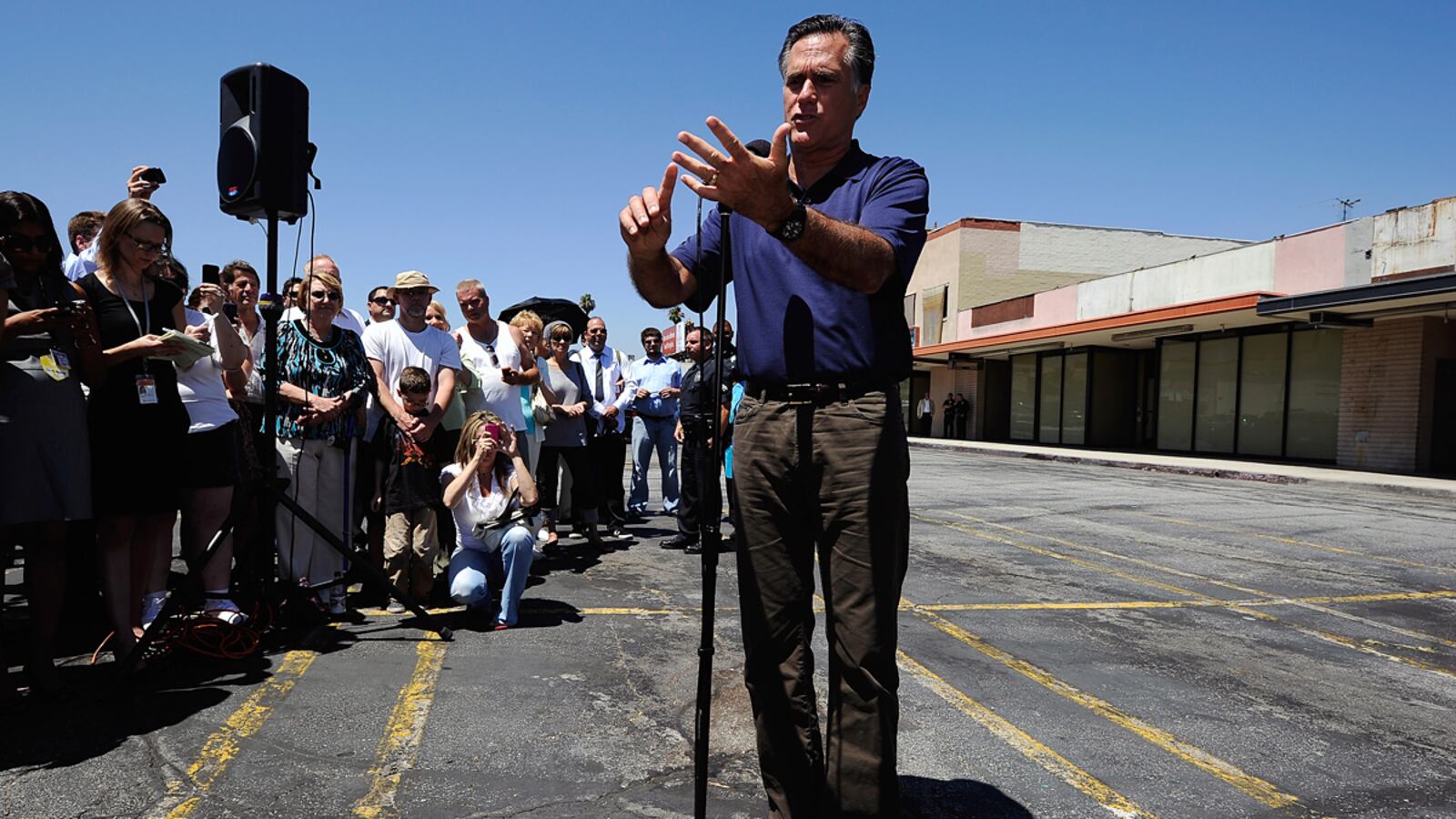There is a certain karmic balance in Mitt Romney’s decision to stake his White House bid on President Obama’s economic record. Like Obama, the former Massachusetts governor took office during a severe recession, struggled to boost job growth, and spent perhaps too much time trying to solve the riddle of health care. Now his economic record is under scrutiny in an unforgiving campaign environment, and it’s as flawed as Obama’s.
Romney often, and correctly by some measures, says Massachusetts had more jobs at the end of his one term as governor than at the beginning. Yet the increase was tiny no matter how you slice the data, and the state ranked 49th in job creation for half of his term before moving up to 36th in his final year. That’s a difficult record to run on, especially when two White House rivals and a likely third have much better ones.
The statistics, already in use in Democratic attack videos against Romney, raise significant questions. Among them: whether Romney did all he could to spur job creation in his state, and whether he displayed expertise that could help bring the nation out of a historic recession. The numbers also undercut his central argument that unlike Obama, he is wise and sophisticated in the ways of business and job creation.
“His record suggests that he does not have the answer for dealing with what the country faces,” says economist Andrew Sum, a registered independent who directs the Center for Labor Market Studies at Boston’s Northeastern University. “I’m not trying to blame everything on Romney. But there was no evidence of any kind of turnaround in Massachusetts.”
Analysts in Massachusetts describe a governor personally engaged in economic development at the CEO level, attuned to the needs of in-state businesses weighing expansion, and ultimately successful in helping streamline his state’s unwieldy permit process. They also, however, describe a chief executive who raised corporate taxes three years in a row and did little to stop his state’s manufacturing slide beyond continuing existing worker-training programs.

Romney did even less to pitch his state around the country as a great place to live and work, a pledge he had campaigned on. “Everybody would agree that he and the administration fell way short on that promise,” says Michael Widmer, a former aide to Democratic Gov. Michael Dukakis who is now president of the nonpartisan, employer-funded Massachusetts Taxpayers Foundation. "He never really did do that much in the first two years. Then in the last two years he was campaigning for president.”
In fact, far from acting as chief advocate and recruiter for Massachusetts, Romney made hay with Republicans around the country by cracking derogatory jokes about his state's liberal bent—for instance, comparing himself to “a cattle rancher at a vegetarian convention.” “He said he’d represent us, and then he went out and bad-mouthed the state,” Sum says. It was, says Widmer, “just the opposite” of being an ambassador.
Romney’s jobs record was nearly flat, ranging from a small gain or a small loss depending on how you measure. A comparison of annual employment totals for the year before he took office and 2006, the final year of his term, the method recommended by the Center for Labor Market Studies, shows a loss of 13,800 jobs—a .4 percent decrease from a baseline of 3,259,300 jobs in 2002.
How did that stack up with the rest of the country—and states led by governors now running for president, or likely to do so? Over the same period, job growth was 4.4 percent nationally, 3.5 percent in Minnesota under Tim Pawlenty, and 6.9 percent in Texas under Rick Perry. Utah, where Jon Huntsman took office in January 2005, posted job growth of 9 percent from 2004 to 2006.
Romney inarguably inherited some special challenges. Massachusetts had the highest job-loss rate among the 50 states between March 2001 and March 2004. Its huge, academia-driven high-tech sector took a severe hit in the dotcom bust: More than half the lost jobs were in the tech sector, according to a 2007 report sponsored by the nonpartisan MassInc.org. Manufacturing also took a dive.
Yet he also had a lot to work with, including the state’s enviable quality of life, easy access to capital, the best-educated labor force in the country (more than half of Massachusetts workers have an associate's degree or higher), and enormous economic capacity in science and technology (first in the nation, according to a recent ranking by an independent economic think tank).
Romney did notch several high-profile victories. His chief economic adviser for most of his term, Ranch Kimball, says the governor “worked his tail off” to prevent the closure of Hampton Air Force Base (a major technology-procurement hub) and win a new biotech facility built by Bristol-Myers Squibb (which chose Massachusetts over two overseas sites and one in North Carolina). Romney also enlisted Kimball to form a 22-agency business resource team, a one-stop shop for companies looking to expand or relocate. Every Monday the team reviewed potential sources of new jobs and quickly compiled guidance for each firm on incentives, sites, permits, training funds, and the like.
In a potentially significant legacy, given the state’s discouraging regulatory thicket, Romney pushed through what Kimball calls a “landmark”: a bill allowing communities to become part of a standardized, relatively quick permit process. So far, 81 of 351 localities have signed up. Projects they have snagged include a mall, a supermarket, a slaughterhouse, a food-service distribution center, and “the world’s largest automated living cell manufacturing plant.”
The great bulk of the Romney team’s care and feeding was for in-state companies, and his campaign pledge to recruit business from elsewhere may have been unrealistic. It is not easy for a governor to persuade companies to come to a state, says Richard Lord, president of Associated Industries of Massachusetts, which has 7,000 member companies. “The focus should be on improving the business climate so the existing companies can grow and expand and prosper,” he says. In his view, Romney did a good job on that front.
Lord is less enamored of Romney’s record of raising $542 million in corporate fees and tax hikes. “We were in the midst of a pretty tough recession. It was the wrong time to be increasing taxes,” Lord says. “And to do it three years in a row certainly created an unpredictable tax environment here. Companies value predictability. When the tax code changes every year, it’s hard to plan.”
Widmer says Romney’s tax policies “exacerbated the competitive disadvantage” of the state’s already high cost of doing business. “I don’t know why he continued down that path” after resolving his first-year budget crisis, Widmer says.
Nor did Romney emulate other states that were trying innovative ways to bolster manufacturing, though his state’s job loss in that sector was far steeper than in the rest of the country. “We didn’t do anything,” Sum says. “He just didn’t have any experience dealing with it. He was not like his dad, running a manufacturing firm. He was interested in acquiring companies and cutting staff” as head of Bain Capital.
In defense of his record, Romney could, with some justification, plead dire circumstances due to recession and dotcom dependency, and point to modest success on the margins. But he shouldn’t expect Obama or his GOP rivals to cut him a break.
When he attacks the president as a failure, he doesn’t remind anyone that Obama took office amid a terrifying economic freefall and now is presiding over at least a trickle of job creation. No, Romney says that Obama made the recession worse.
In politics, sad to say, context is the first casualty. In this instance, that puts Romney and Obama on a level playing field.
Editor's note: This story has been revised to more accurately reflect the change in employment during Romney's term as governor of Massachusetts.





